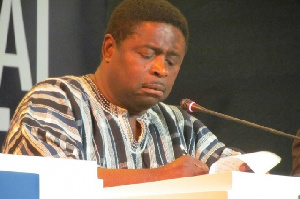- General News
- Crime & Punishment
- Politics
- Regional
- Editorial
- Health
- Ghanaians Abroad
- Tabloid
- Africa News
- Religion
Politics of Wednesday, 20 November 2019
Source: classfmonline.com
Referendum needless, stop it – Dr. Abu Sakara Foster
A leading member of the National Interest Movement, Dr. Abu Sakara Foster, has urged the Electoral Commission (EC) and the Ghanaian authorities to halt the upcoming 17 December 2019 referendum entirely.
Dr. Foster is against political parties taking part in the election of Metropolitan, Municipal and District Chief Executives (MMDCEs).
The amendment of Article 243 (1) of the 1992 Constitution, which requires the President to appoint Metropolitan, Municipal and District Chief Executives (MMDCEs) has gone through different stages in Parliament and will soon come up for debate.
“If you take the power away from me and you give that, either to a party political head or anybody else, then you are defeating the very purpose of decentralization, and on this score, I say: ‘Stop the referendum’,” he said on Wednesday, 20 November 2019, at the launch of a report by think tank Imani Africa dubbed: "Promoting social accountability to enhance spending efficiency at the local government level".
In his opinion, the presentation of a bill to Parliament “does not necessarily mean that you will pass it”.
Also, he holds the view that the authorities “are not compelled, in the referendum, to ensure that if I vote ‘No’, people are elected on a non-partisan basis”.
He, thus, said the referendum will not address the current challenges of a centralised system and accountability by MMDCEs.
“If you vote ‘Yes’, you legitimise partisan participation. If you vote ‘No’, the status quo prevails. The status quo is that it is by appointment,” he explained.
Dr Foster also criticised the two major political parties – the governing New Patriotic Party (NPP) and the main opposition National Democratic Congress (NDC) – for their lackadaisical attitude over the past years, in ensuring that the electorate vote for their own leaders at the district, metropolitan and municipal levels.
He said the two parties have been in power for more than two decades, and “if they wanted to pass it, it would have been passed”.
Entertainment










